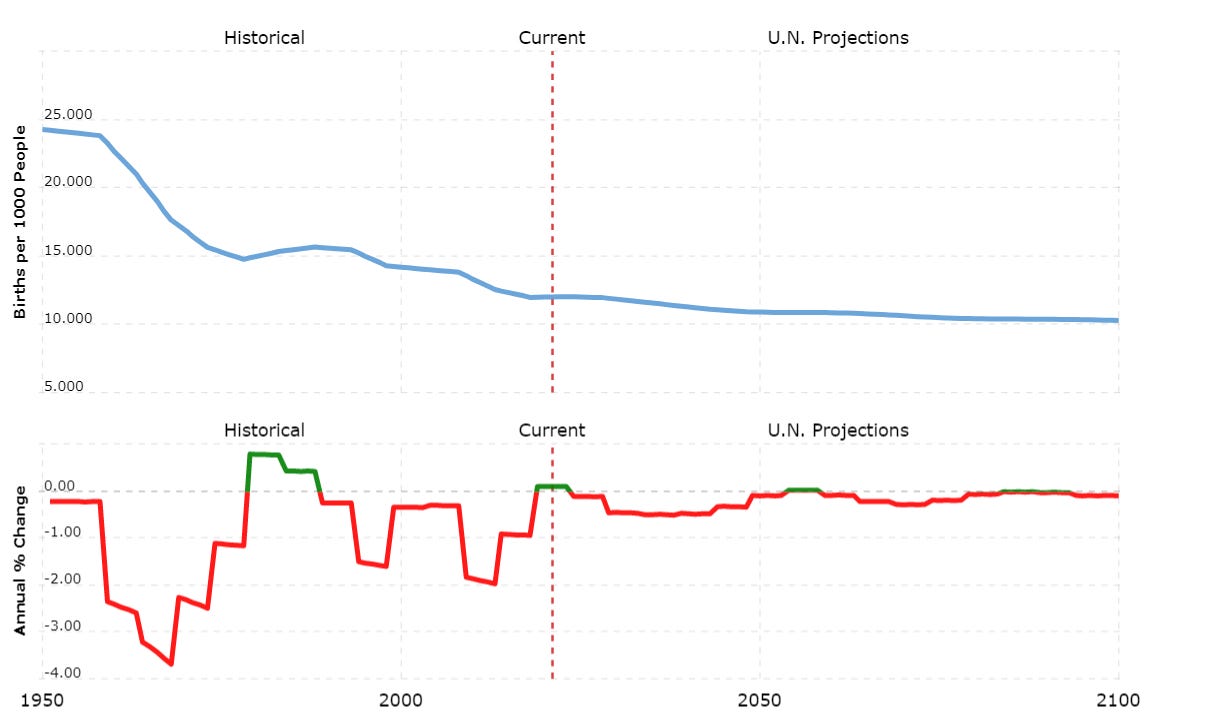Happy Mother’s Day to all the moms in our readership! We need more of you! We really do!
One of the surprising statistics to come out of the pandemic was the fact that the US birthrate fell four percent to a level equivalent to 1979. I once thought that the pandemic might usher in a baby boom, but it seems that the opposite is true. Given the chance to enjoy a year of “Netflix and chill,” Americans seem to have chosen Netflix over the “chill.” To people concerned about overpopulation, this is good news, but to economists and demographic planners, it does not bode well for America’s future.

The US has long had a declining birthrate. We aren’t alone in that. There is a pattern in many industrialized countries of a long-term trend toward fewer and fewer children. The two main reasons for this are probably the easy availability of birth control and the fact that, for urban and suburban non-farm workers, children are more of an expense than for rural agricultural families that depended on large numbers of children to help grow and harvest crops.
The problem may go even deeper. As America establishes itself as a post-Christian nation, there is some evidence that more Americans are eschewing the cost of raising children, which is significant in both time and money, for more materialistic lifestyles. Not having kids can open the door to nicer things, more travel, and a posh existence.
For a long time, the US has done better at shoring up our population than other countries such as Japan and Russia. However, doing better just meant that our birth rates were declining at a slower rate and now the bottom seems to have dropped out.
"The rate has generally been below replacement since 1971 and has consistently been below replacement since 2007," the National Center for Health Statistics said.
There are several problems associated with low birth rates, but chief among them is the fact that low birth rates mean that our population is getting older. This affects everything from tax revenues to social spending to job and product markets to our ability to project military force. There will be fewer scientists and engineers to spark new ideas, fewer workers to produce goods and services, fewer consumers to buy them, and a smaller tax base. Fewer new workers will be available to support entitlement programs for retirees.
If we can’t reverse the trend, there are options. Immigrants have traditionally helped to fill out labor forces where there are not enough native workers. This would not be a popular solution with a large number of Americans, however. Dramatic increases in immigration paired with declining American birth rates would almost certainly change the culture of the nation in unforeseeable ways.
In America’s case, technology may solve some of our population dilemmas, especially since we are on the cusp of a revolution in artificial intelligence that may be about to eliminate a large number of jobs anyway. Robots have already proven their worth in manufacturing and are increasingly used by the military as well. We could also follow Japan’s lead on using robots for health care and caring for seniors.
Now, I like robots as much as anybody else, but as I get older, I’d much rather have flesh-and-blood humans around to comfort me and care for me. And for that, we need more mamas having more children.
Of course, there is more to being a mama than just giving birth. Being a mama is a lifetime commitment that includes long periods of being on call 24-7. Mamas not only bring the next generation into the world; they shape it, guide it, and teach it to be disciplined, empathetic, and civilized.
So, I salute the mothers of America on this Mother’s Day. We need more of you. We need to make America great again by growing a new generation of Americans.
Ladies and gentlemen, y’all need to get busy and get busy!
On a serious note (as if depopulation isn’t serious), I’d like to wish a Happy Mother’s Day to my wife and the mother of my children, Debi, as well as my mama, Pat, and my mother-in-law, Debo, who has been like a second mom to me. These women have made me who I am today and I love them all.
I’d also like to wish a Happy Mother’s Day to all the other mothers and moms-to-be reading this. Motherhood is often a difficult and thankless job, but it is easily one of the most critical roles in the country and the world. Moms don’t get enough credit.

No comments:
Post a Comment